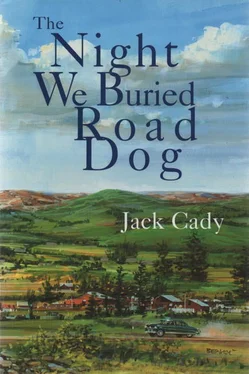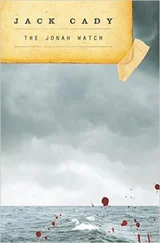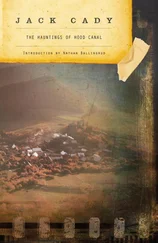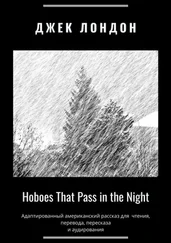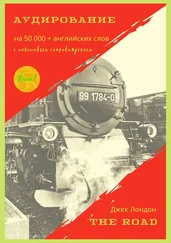“These old boys are laughing now,” Brother Jesse told me, “but I predict a change in attitude. I reckon they’ll come around before first snowfall.”
With his car dead, Jesse had to find a set of wheels. He swapped an old hay rake and a gang of discs for a ’49 Chevrolet.
“It wouldn’t pull the doorknob off a cathouse,” he told me. “It’s just to get around in while I shop.”
The whole deal was going to take some time. Knowing Jesse, I figured he’d go through half a dozen trades before finding something comfortable. And I was right.
He first showed up in an old Packard hearse that once belonged to a funeral home in Billings. He’d swapped the Chev for the hearse, plus a gilt-covered coffin so gaudy it wouldn’t fit anybody but a radio preacher. He swapped the hearse to Sam Winder, who aimed to use it for hunting trips. Sam’s dogs wouldn’t go anywhere near the thing. Sam opened all the windows and the back door, then took the hearse up to speed trying to blow out all the ghosts. The dogs still wouldn’t go near it. Sam said, “To hell with it,” and pushed it into a ravine. Every rabbit and fox and varmint in that ravine came bailing out, and nobody has gone in there ever since.
Jesse traded the coffin to Old Man Jefferson, who parked the thing in his woodshed. Jefferson was supposed to be on his last legs, but figured he wasn’t ever, never, going to die if his poor body knew it would be buried in that monstrosity. It worked for several years, too, until a bad winter came along, and he split it up for firewood. But we still remember him.
Jesse came out of those trades with a ’47 Pontiac and a Model T. He sold the Model T to a collector, then traded the Pontiac and forty bales of hay for a ’53 Studebaker. He swapped the Studebaker for a ratty pickup and all the equipment in a restaurant that went bust. He peddled the equipment to some other poor fellow who was hell-bent to go bust in the restaurant business. Then he traded the pickup for a motorcycle, plus a ’51 Plymouth that would just about get out of its own way. By the time he peddled both of them, he had his pockets full of cash and was riding shanks’ mare.
“Jed,” he told me, “let’s you and me go to the big city.” He was pretty happy, but I remembered how scared I’d been at the funeral. I admit to being skittish.
From the center of north Montana, there weren’t a championship lot of big cities. West was Seattle, which was sort of rainy and mythological. North was Winnipeg, a cow town. South was Salt Lake City. To the east….
“The hell with it,” Brother Jesse said. “We’ll go to Minneapolis.”
It was about a thousand miles. Maybe fifteen hours, what with the roads. You could sail Montana and North Dakota, but those Minnesota cops were humorless.
I was shoving a sweet old ’53 DeSoto. It had a good bit under the bonnet, but the suspension would make a grown man cry. It was a beautiful beast, though. Once you got up to speed, that front end would track like a cat. The upholstery was like brand-new. The radio worked. There wasn’t a scratch or ding on it. I had myself a banker’s car, and there I was, only nineteen.
“We may want to loiter,” Jesse told me. “Plan on a couple of overnights.”
I had a job, but told myself that I was due for a vacation; and so screw it. Brother Jesse put down food for the tabbies and whistled up the dogs. Potato hopped into the back seat in his large, dumb way. He looked expectant. Chip sort of hesitated. He made a couple of jumps straight up, then backed down and started barking. Jesse scooped him up and shoved him in with old Potato dog.
“The upholstery,” I hollered. It was the first time I ever stood up to Jesse.
Jesse got an old piece of tarp to put under the dogs. “Pee, and you’re a goner,” he told Potato.
We drove steady through the early-summer morning. The DeSoto hung in around eighty, which was no more than you’d want, considering the suspension. Rangeland gave way to cropland. The radio plugged away with western music, beef prices, and an occasional preacher saying, “Grace” and “Gimmie.” Highway 2 rolled straight ahead, sometimes rising gradual, so that cars appeared like rapid-running spooks out of the blind entries. There’d be a little flash of sunlight from a windshield. Then a car would appear over the rise, and usually it was wailing.
We came across a hell of a wreck just beyond Havre. A new Mercury station wagon rolled about fifteen times across the landscape. There were two nice-dressed people and two children. Not one of them ever stood a chance. They rattled like dice in a drum. I didn’t want to see what I was looking at.
Bad wrecks always made me sick, but not sick to puking. That would not have been manly. I prayed for those people under my breath and got all shaky. We pulled into a crossroads bar for a sandwich and a beer. The dogs hopped out. Plenty of hubcaps were nailed on the wall of the bar. We took a couple of them down and filled them with water from an outside tap. The dogs drank and peed.
“I’ve attended a couple myself,” Brother Jesse said about the wreck.
“Drove a Terraplane off a bridge back in ’53. Damn near drownded.” Jesse wasn’t about to admit to feeling bad. He just turned thoughtful.
“This here is a big territory,” he said to no one in particular, “But you can get across her if you hustle. I reckon that Merc was loaded wrong, or blew a tire.” Beyond the windows of the bar, eight metal crosses lined the highway. Somebody had tied red plastic roses on one of them. Another one had plastic violets and forget-me-nots.
We lingered a little. Jesse talked to the guy at the bar, and I ran a rack at the pool table. Then Jesse bought a six-pack while I headed for the can. Since it was still early in the day, the can was clean; all the last night’s pee and spit mopped from the floor. Somebody had just painted the walls. There wasn’t a thing written on them, except that Road Dog had signed in.
Road Dog
How are things in Glocca Mora?
His script was spidery and perfect, like an artist who drew a signature. I touched the paint, and it was still tacky. We had missed The Dog by only a few minutes.
* * * *
Road Dog was like Jesse in a way. Nobody could say exactly when he first showed up, but one day he was there. We started seeing the name
“Road Dog” written in what Matt Simons called “a fine Spencerian hand.”
There was always a message attached, and Matt called them “cryptic.” The signature and messages flashed from the walls of cans in bars, truck stops, and roadside cafés through four states.
We didn’t know Road Dog’s route at first. Most guys were tied to work or home or laziness. In a year or two, though, Road Dog’s trail got mapped. His fine hand showed up all along Highway 2, trailed east into North Dakota, dropped south through South Dakota, then ran back west across Wyoming. He popped north through Missoula and climbed the state until he connected with Highway 2 again. Road Dog, whoever he was, ran a constant square of road that covered roughly two thousand miles.
Sam Winder claimed Road Dog was a Communist who taught social studies at U. of Montana. “Because,” Sam claimed, “that kind of writing comes from Europe. That writing ain’t U.S.A.”
Mike Tarbush figured Road Dog was a retired cartoonist from a newspaper. He figured nobody could spot The Dog because The Dog slipped past us in a Nash, or some other old-granny car.
Brother Jesse suggested that Road Dog was a truck driver, or maybe a gypsy, but sounded like he knew better.
Matt Simons supposed Road Dog was a traveling salesman with a flair for advertising. Matt based his notion on one of the cryptic messages:
Road Dog
Читать дальше
